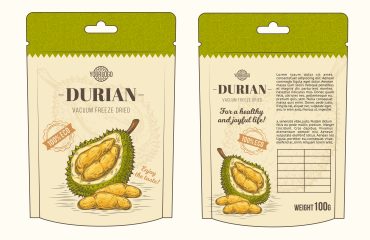Biodegradable Stand-Up Pouches: A Sustainable Choice for Food Packaging in Australia

As more people want eco-friendly options, businesses in Australia are looking for alternatives to traditional plastic packaging. Biodegradable stand-up pouches in Australia have become a popular choice for food packaging. These pouches provide a sustainable solution that meets consumer demand for green products. Thanks to improvements in biodegradable materials, companies can now use innovative packaging that reduces waste and helps protect the planet.
The Rise of Biodegradable Materials in Packaging
Biodegradable packaging breaks down naturally and doesn’t leave harmful residues. Recent innovations have created compostable and plant-based packaging materials that are strong and good for the environment. Some common biodegradable materials used in stand-up pouches include:
- PLA (Polylactic Acid): PLA, made from cornstarch or sugarcane, is a compostable alternative to petroleum-based plastic. It is commonly used in food packaging because it keeps products fresh and breaks down completely in the right conditions.
- PHA (Polyhydroxyalkanoates): PHA is a type of plastic made through microbial fermentation. It breaks down naturally in soil and water, making it a great option for eco-friendly packaging.
- Kraft Paper with Biodegradable Liners: This packaging solution uses renewable paper and biodegradable inner coatings to provide a plastic-free option for dry food products.
These materials help businesses package their products safely while lowering their impact on the environment. As more research and innovation happen, biodegradable packaging options are becoming more efficient and affordable.
Environmental Benefits of Biodegradable Stand-Up Pouches
Swapping to biodegradable packaging is crucial for reducing plastic pollution. While regular plastic can take hundreds of years to decompose, biodegradable stand-up pouches break down within months to a few years, depending on the materials and disposal methods.
Key environmental benefits include:
- Reduced Landfill Waste: Biodegradable pouches break down naturally, which helps reduce waste in landfills.
- Lower Carbon Footprint: Many biodegradable materials need less energy to make, which cuts down carbon emissions compared to regular plastic packaging.
- Safer for Wildlife: Biodegradable materials do not harm marine and land animals in the long run, unlike regular plastics.
By making the switch to biodegradable stand-up pouches, businesses can align their packaging strategies with sustainability goals, benefiting both their brand reputation and the planet.
Why Australian Brands Are Embracing Biodegradable Packaging
Australian businesses are increasingly choosing eco-friendly packaging. Several key factors drive this change:
- Consumer Demand for Sustainability: Australian shoppers care about the environment. Many prefer brands that focus on sustainability and are willing to pay more for eco-friendly packaging. This trend encourages businesses to use biodegradable options.
- Government Regulations and Initiatives: State governments in Australia are introducing laws to reduce single-use plastics and support compostable packaging.
According to the Australian Packaging Covenant Organisation (APCO), Australia has set a goal for 100% of packaging to be reusable, recyclable, or compostable by 2025. These regulations push businesses to consider biodegradable solutions. - Corporate Social Responsibility (CSR): Companies see sustainability as a vital part of their brand. Using biodegradable packaging shows their commitment to protecting the environment, which helps build customer loyalty and strengthen their brand.
- Cost-Effective and Scalable Solutions: Improvements in biodegradable packaging technology have made these options cheaper and easier to use. As production methods get better and demand rises, costs keep falling, making biodegradable packaging a practical choice for all businesses.
The Future of Food Packaging in Australia
Food packaging in Australia is moving towards sustainability. As new materials are developed, biodegradable options will become more available. Businesses that switch to eco-friendly packaging early will stand out and help the environment.
Transitioning to biodegradable stand-up pouches and other sustainable food packaging supplies in Australia is more than just a trend; it is a necessary step towards reducing the negative impact of plastic waste. By adopting these innovative packaging solutions, brands can meet consumer demands, comply with evolving regulations, and play a crucial role in creating a more sustainable future.
Frequently Asked Questions (FAQs)
2. What materials are used in biodegradable stand-up pouches?
The main materials used in biodegradable stand-up pouches include:
- PLA (Polylactic Acid): A compostable material made from cornstarch or sugarcane, known for its ability to maintain freshness.
- PHA (Polyhydroxyalkanoates): A naturally occurring polyester that decomposes in soil and marine environments.
- Kraft Paper with Biodegradable Liners: A plastic-free option combining renewable paper with biodegradable inner coatings, suitable for dry food products.
3. What are the environmental benefits of biodegradable stand-up pouches?
Biodegradable stand-up pouches offer several key environmental benefits:
- Reduced landfill waste: They break down naturally, minimising waste accumulation in landfills.
- Lower carbon footprint: Many biodegradable materials are produced with less energy, reducing carbon emissions compared to traditional plastic.
- Safer for wildlife: These materials do not threaten marine or terrestrial life in the long term, unlike plastics, which can persist in ecosystems for hundreds of years.
4. Why are Australian businesses adopting biodegradable packaging?
Several factors are driving Australian businesses to adopt biodegradable packaging:
- Consumer demand: Eco-conscious shoppers increasingly seek sustainable packaging, and many are prepared to pay extra for environmentally friendly options.
- Government regulations: Australian state governments are phasing out single-use plastics, encouraging compostable packaging, and guiding businesses toward eco-friendly alternatives.
- Corporate social responsibility (CSR) involves incorporating sustainability into a company's brand identity, which enhances customer loyalty and improves brand credibility.
- Cost-effectiveness: Advances in biodegradable packaging technology have made these solutions more affordable and scalable, making them accessible to businesses of all sizes.






You must be logged in to post a comment.